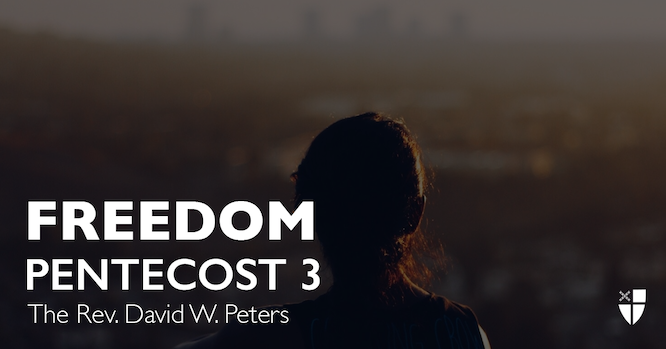Freedom, Proper 8 (C) – 2019
June 30, 2019
[RCL]: 2 Kings 2:1-2, 6-14; Psalm 77:1-2, 11-20; Galatians 5:1,13-25; Luke 9:51-62

It may surprise us that the word “freedom” is not once found in our Declaration of Independence, the document that launched a new nation on July 4, 1776. Instead of “freedom,” the Declaration highlighted “liberty,” along with “life” and the “pursuit of happiness,” as our inalienable rights. Over the years, the word “liberty” has fallen out of our national vocabulary, and “freedom” has replaced it. Today, we celebrate our freedom with parades and fireworks; we commemorate those who died in war with the phrase, “Freedom isn’t free,” and we uphold our freedom of speech vigorously. But, despite talking a lot about freedom, we are not always sure what it means.
The most obvious meaning of freedom is the ability to do and say whatever we want, without interference from any authority or institution. With this definition of freedom, it is little wonder we often disagree on what it means to be a freedom-loving American. To use an example from the coming celebration on July 4th, the freedom to blast off massive amounts of fireworks in one’s driveway is severely limited by most city governments, due to the noise and the risk of fire. So, even on this day where we celebrate our freedom, our freedom to create giant explosions is balanced by our neighbors’ freedom to live in an explosion-free environment. Our freedoms are always in tension with the freedom of the people around us. When we think of our neighbors, freedom isn’t just the ability to do whatever we want, especially if that action puts our neighbors at risk.
As American Christians, we are often tempted to define freedom through the lens of American society and culture. But freedom is older than America, older than England, and older than any other modern nation-state, no matter how wonderful it may be to live there.
Our second lesson today tells us that, “For freedom Christ has set us free.” The freedom St. Paul writes about here is in contrast to the “yoke of slavery.” Sin is slavery because we lose our freedom to do good. In our sin, our failures crush us. The more laws we break, the more the law breaks us. We become discouraged with our lack of progress—our inability to be the kind of people we think we ought to be. In sin, we are locked into a yoke, unable to do anything but repeat the same cycle of failure, shame, trying harder, and more failure.
Jesus set us free on the cross, embracing us, just as we are in our sin. Our enslavement to the cycle of self-destruction is forever broken as we share his broken body and drink his shed blood. We are free in Christ—free to do good things, and not to indulge our desires to control other people or have power over them. Each of us is free in Christ to be for the world what he was for the world: an agent of reconciliation and love.
Our gospel lesson tells us, “When the days drew near for [Jesus] to be taken up, he set his face to go to Jerusalem.” Jesus was walking into a death-trap, and yet he set his face, stone-like in the Greek, towards Jerusalem. He knew what he was getting into, and yet he moved toward Jerusalem because he had the freedom to love. Jesus was determined to love the whole world, including the people who actively rejected him. This is the ultimate freedom, the freedom to love those who do not love us. The ultimate freedom is the freedom to love our enemies.
Freedom to love our enemies is empowered by the Holy Spirit; it cannot come from our own willpower or self-determination. We can practice this kind of freedom when we are filled with Spirit and begin manifesting the fruits of the Spirit: love, joy, peace, patience, kindness, generosity, faithfulness, gentleness, and self-control. Only the truly free can live out these fruits.
The image of freedom we find in our second lesson, “For freedom Christ has set us free,” is this image of the fruits of the Spirit. Perhaps we can compare it to the watermelon at many July 4 picnics. Watermelon tastes like summer. Perhaps we associate it with the freedom of being off from school as children. When we experience the freedom to practice the fruits of the Spirit, we become a blessing of freedom to everyone we meet. This is the freedom we were created to experience, and it is the freedom that Jesus calls us to today. “Come, be free,” Jesus seems to say. “Follow me, and you will bless the world with your love, joy, peace, patience, kindness, generosity, faithfulness, gentleness, and self-control.”
Don’t forget to subscribe to the Sermons That Work podcast to hear this sermon and more on your favorite podcasting app! Recordings are released the Thursday before each liturgical date.
Receive Free Weekly Sermons That Work Resources!


